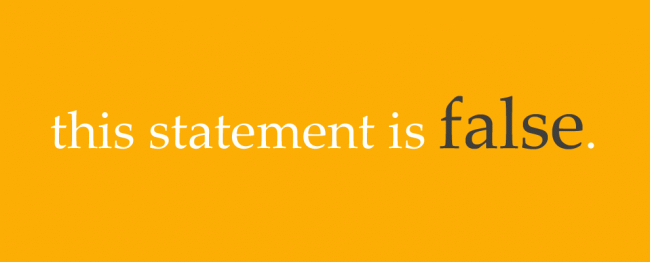The Paradox of Purpose
I was asked recently what I want my personal legacy to be. It is such a big question and I wasn’t ready for it, so I just mumbled something about trying to leave the planet in better shape than I found it, and then wandered off to think about it some more.
In parallel we’ve been doing some work recently with a global professional services company and also with a large charity who are both trying to redefine their purpose to better combine their commercial and social impact, which is exciting and challenging in equal measure. Both are starting from very different places yet want to become a ‘social business’ and together we are grappling with the implications of what concept really means.

It strikes me the finding your purpose, at both an organisational and individual level, is in many ways a perfect paradox, namely a statement that seems contradictory but is actually valid (such as the ‘liars paradox’ in the image above is both true if it’s false, and also false if it’s true!).
And when it comes to the idea of being a ‘social business’ on the one hand if you don’t care about what you do then why should anybody else buy into it? On the other hand, it’s easy to care a little bit too much about looking after others, you can sometimes take your eye off the ball in terms of building a sustainable business.
We’ve been grappling with the concept of ‘doing well by doing good’ since our very first project since we started 100%Open creating the award winning Do Some Good App with Orange. And it continues to be a huge challenge not only for companies but also charities and government organisations too.
And according to this annual Gallup poll, on average only 30% of employees are engaged in their jobs in 2014. That means 70% are not engaged or actively disengaged. This leads to a phenomenal wastage of talent and resource and in some cases be destructive. Therefore it’s not surprising that many millennials are leaving more secure and permanent employment to create their own ventures so they can work 16 hours a day for themselves, rather than 8 hours a day for somebody else.
“From what we get, we can make a living; what we give, however, makes a life.” Arthur Ashe
Within this context, and reflecting on the question that prompted this post, I really don’t see how we have any choice in an increasingly hyper-personalised world but to embrace this paradox of purpose. Not only to work harder to find our own but also to figure out how to enable others to find and fulfil theirs. I’m going work a bit more on being able to articulate mine more clearly and report back to anybody who might be interested, and in the meantime would love to hear about yours too and if there is anything I/we can do to help.
by Roland
Image credit: http://xrume.com/top-ten-paradoxes/
I’m interested in holacracy’s take on an evolving purpose.
That we often treat our organisations like kids with us being the parents telling them what they should and shouldn’t do.
And just like a kid with lots of parents all telling it slightly different things our companies get confused and unable to act.
With this constant feedback on what we want it to do stopping the real purpose of the business becoming apparent through experience.